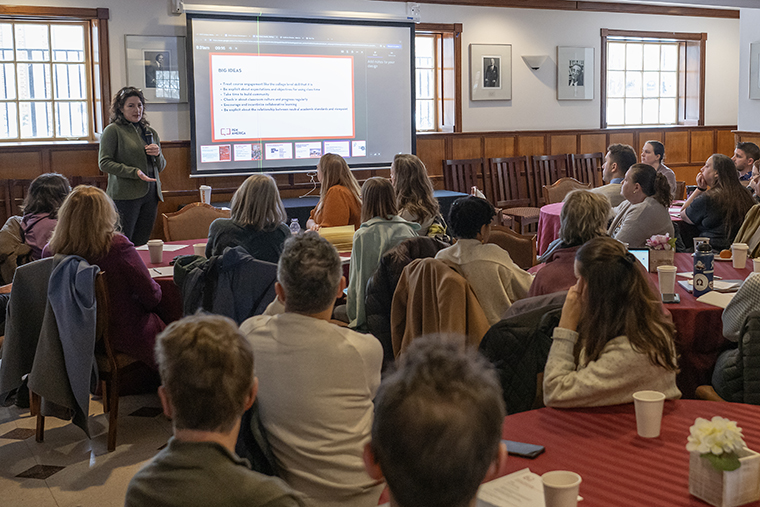Reducing Conflict, Encouraging Dialogue
PEN America workshop provides faculty and staff with tools for dialogue across differences and de-escalating conflicts around free speech and inclusion.

PEN America facilitator Lara Schwartz speaks in the faculty lounge during the Campus Free Speech and Inclusion Workshop.Campuses across the country have been struggling with free speech issues, especially those involving inclusion, cancel culture, hurtful speech, safety, and academic freedom. Washington College is no exception.
The difficulty of these issues was brought home last fall when a speaker who had previously expressed controversial views about the LGBTQ+ community was invited to speak on campus about an unrelated topic. Many students, faculty, and staff were angered and hurt that he had been invited.
The College made it clear that while it did not endorse the person's views, there was intrinsic value in civic discourse. The community was asked to voice their opinions and objections in peaceful and civil ways. However, a handful of protesters disrupted the event, and the speaker left without finishing his speech. The ensuing debate on campus raised difficult questions about how an institution that is open to legitimate intellectual debate can create an environment that encourages discourse with room for disagreement.
“Conflicts regarding freedom of expression in higher education have been in the news for some time,” said Sean Meehan, co-director of the Cromwell Center for Teaching and Learning (CTL). In June 2023, long before the controversial visit, the center had already contacted PEN America, a nonprofit organization dedicated to free expression, about leading a workshop on the topic.
On January 18, about 115 members of the faculty, staff, and administration attended an all-day workshop led by PEN America on how free speech and principles of inclusion and safety can work in practical, real-world terms. Sessions on navigating tense moments, facilitating classroom engagement, and free speech and academic freedom were conducted by facilitators Neijma Celestine-Donner and Lara Schwartz. Topics discussed included knowing how to lay the groundwork for controversial speech and how to react to such incidents.
“We reached out to PEN America, specifically, because we were impressed with their orientation toward campus free expression and inclusivity,” said Emily Steinmetz, co-director for Cromwell CTL. She said the workshop aimed to establish a shared understanding of academic freedom and to help all attendees identify their own unique roles in cultivating a campus culture that values everyone and enables engaging with diverse ideas.
Attendees were given tools for responding to tense moments, including de-escalation strategies, establishing ground rules for discussions, and knowing when to call someone in to reflect on their words or actions and when to call them out.
Celestine-Donner distinguished between punitive and restorative responses and emphasized that restoring the trust and well-being of members of a community is more productive than becoming overly concerned with punishing someone for causing offense. A key strategy is to help students understand the difference between being uncomfortable with ideas versus feeling truly unsafe. Students—especially first-year students fresh out of high school—should be educated on the rules and norms of speech, Schwartz said. Both facilitators endorsed having future free speech workshops for students to learn what it is and how it can protect and work for them.
Meehan said the key takeaways from the workshop included the importance of establishing early and ongoing principles and conversations about protecting free expression while valuing an inclusive community, standing by those values in challenging situations, and recognizing that protecting free expression is where interactions around controversial topics begin, not end.
“We have the tools and skills for addressing these issues and for better understanding our conflicts,” Meehan said. “They are thoroughly academic tools and skills, it turns out, things we are already good at doing: asking questions, thinking critically, reading thoughtfully, revising our views and assumptions, communicating effectively to multiple audiences. I think we can put these tools to work as we strengthen a more expressive, inclusive community here at Washington College.”
–MacKenzie Brady '21